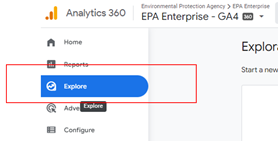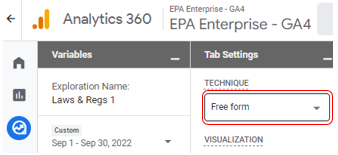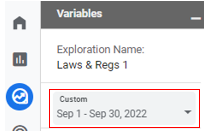Search Terms Analysis (GA4)
EPA content related to Google Analytics is changing.
Google's legacy platform, Universal Analytics (UA), will reach end of life in mid-2023 with a one-time extension for contracting clients such as EPA until July 1, 2024. See KB article.
In these Web Analytics pages, content for Universal Analytics is marked "Google Universal Analytics (legacy)."
Content for the new platform, Google Analytics 4, is marked "Google Analytics 4 (GA4)."
Find which terms visitors searched for:
- to get to your page (incoming search terms), and
- once they looked at your page (outgoing search terms).
For pages with more links than text content, such as home pages, a high bounce rate may indicate that users did not click on any of the links because they did not find what they expected. Learning what terms visitors to that page are looking for can help inform:
- which links you include,
- how prominently you place them on the page, and
- what terms you use in link text.
On this page:
Incoming Search Terms
Incoming searches lead visitors to your page or web area.
There are two types of incoming search terms - both can be reported on using Google Analytics 4.
- Terms used in searches of a public search engine such as Google or Bing. In Google Analytics data, these are called "organic search" channels.
- Terms used in searches of EPA's internal search. In Google Analytics data, these are distinguished from organic search terms by not coming from an "organic search" channel.
The two types of search terms are recorded in Google Analytics 4 and the dimension Session default channel group can be used to filter for one or the other set of search terms.
- for incoming, organic search terms: Session default channel group EXACTLY MATCHES "Organic Search"
- for incoming, internal search terms: Session default channel group DOES NOT EXACTLY MATCH "Organic Search"
In addition, the EPA Search Team makes analytics resources available in Search Central based on usage of EPA's site search. The monthly internal search log is one of these resources.
Monthly Internal Search Log
Search term analytics for internal search includes monthly reports of the terms entered in EPA's internal search (the "Search EPA.gov" box).
- Select a report, then search for the page you're interested in, for example:

- This example indicates that two people in a month who typed "outdoor air quality" into EPA's internal search, then chose the Air Topics page from their search results. They are expecting to find links or information about outdoor air quality on that page, so you would want to make sure you have used those terms in headings or link text on the page.
Incoming Search Terms Report in Google Analytics 4
You can also create a report in Google Analytics that includes searches from other search engines (like Google or Bing), for any time period you choose.
-
Go to the Explore tab

-
Enter an existing exploration or begin a new “Free form” analysis.

-
Select desired date range

-
Add dimensions to your analysis
For example, add: Search Term, Session default channel group, Event name, and Landing page + query string
-
Add metrics
For example, add: Event count
-
Add rows
Rows become the left-most column(s) of the report.
For example, add: Search Term
-
Add values
Values create the data of the report, per row.
For example, add: Event count
-
Add filters
Filters limit data output of a report. See Using Filters in GA4 for details.
For example, add:- Event name EXACTLY MATCHES "view_search_results"
- Session default channel group DOES NOT EXACLY MATCH "Organic Search"
- Landing page + query string BEGINS WITH "/environmental-topics"

-
Use table column header to sort the report

-
This is what you should see:

-
Click the "Export data" icon to save to your computer

Outgoing Search Terms
Outgoing searches are searches from a page or web area that lead visitors away from the page or web area. These are always internal searches in EPA's website search engine, a.k.a., site search. Just as with incoming, internal search terms (discussed above), outgoing, internal search terms can be reported on using Google Analytics 4.
- for outgoing, internal search terms: Session default channel group DOES NOT EXACTLY MATCH "Organic Search"
Outgoing Search Terms Report in Google Analytics 4
If someone visits your page, and then uses the search box instead of clicking any links, it could indicate that they didn't see the link they wanted or expected to see on your page.
To learn what visitors to your page couldn't find:
-
Go to the Explore tab

-
Enter an existing exploration or begin a new “Free form” analysis.

-
Select desired date range

-
Add dimensions to your analysis
For example, add: Search Term, Session default channel group, Event name, and Page referrer
-
Add metrics
For example, add: Event count
-
Add rows
Rows become the left-most column(s) of the report.
For example, add: Search Term, Page referrer
-
Add values
For example, add: Event count
-
Add filters
Filters limit data output of a report. See Using Filters in GA4 for details.
For example, add:- Event name EXACTLY MATCHES "view_search_results"
- Session default channel group DOES NOT EXACLY MATCH "Organic Search"
- Page referrer BEGINS WITH "https://www.epa.gov/environmental-topics"

-
Use table column header to sort the report

-
This is what you should see:

-
Click the "Export data" icon to save to your computer

Improvements You Could Make Based on Search Terms
- Organize links into clearly labeled sections
- Update section labels and link text using the terms from search queries
- Add links to related information, even outside your web area, if a lot of searches indicate users think of it as related
- Change the placement of links to make them more visible
- CrazyEgg Reports can help you improve link placement
